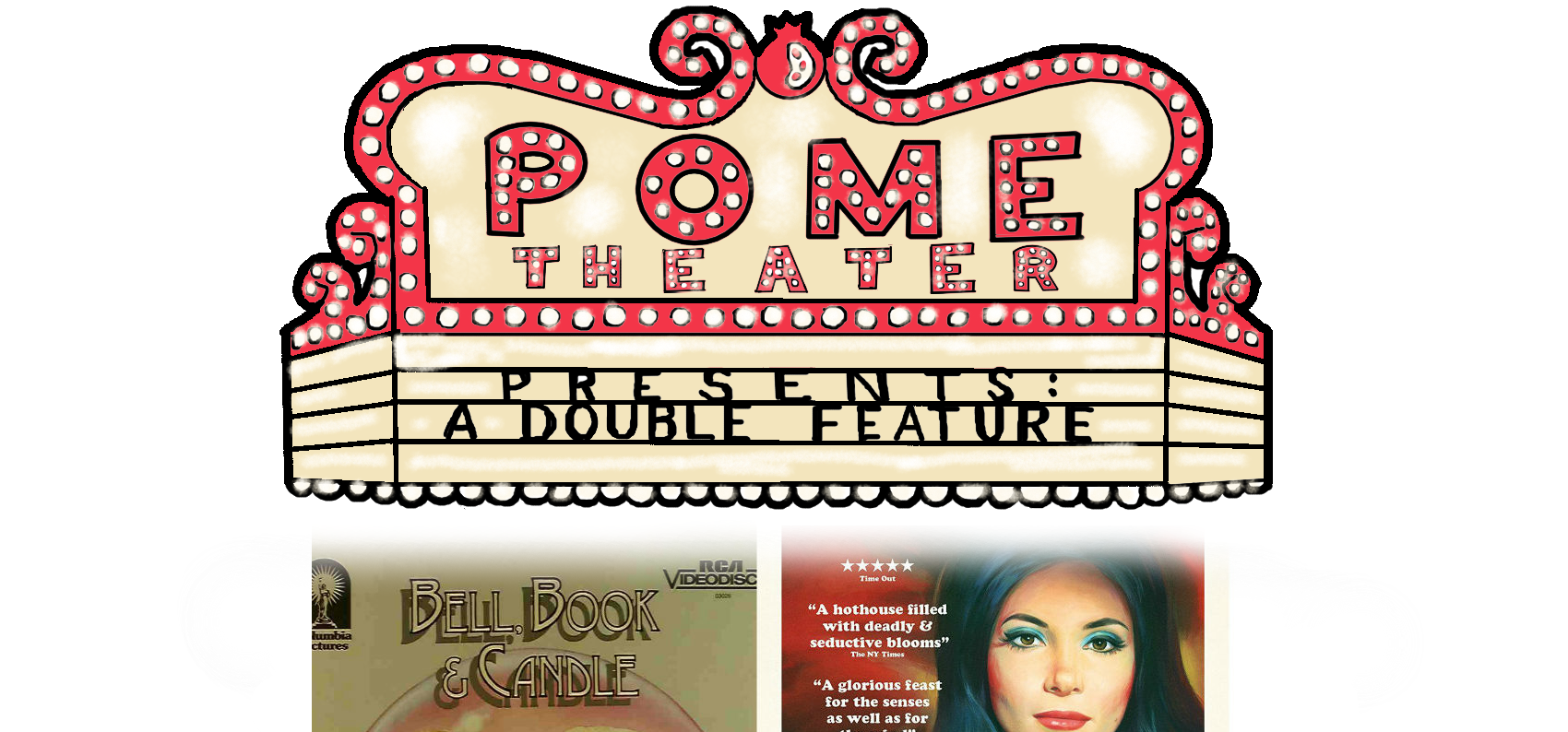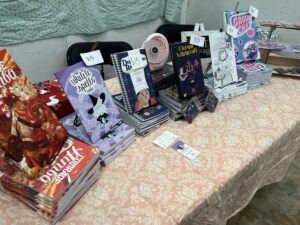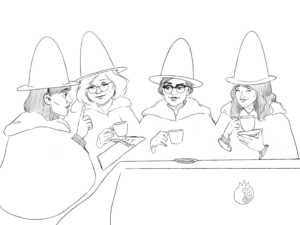Witchcraft has always been associated with deviant femininity, and women (witches) have consistently been punished for that deviance from patriarchal expectation. To be a witch, to have power, is to be independent, to be self-sufficient.
Before we begin, let me just say: love magic is wrong and consent is important. But, the movies I present to you this curséd day are not so much about sexual manipulation as they are about the pressures put on women to motivate that behavior.
This Week:
Bell Book and Candle — The Love Witch
Bell Book and Candle
We begin with Bell Book and Candle (1958). This is the story of a young, intelligent, and independent witch who meets Jimmy Stewart and pursues him with interest, until she learns that he’s engaged. BUT! Then she finds out that the woman he’s engaged to is someone she knows! Someone she went to college with and who was a real bitch to her! (let’s be real though, what else did she expect at Wellesley, the Slytherin of the pleiadal schools).
Gil, our young witch, then decides that she’s totally fine with using magic to steal this man away from his fiancee. So, she does (only to fall in love with him for real!). But, the trouble is that once she falls in love with a man, she is no longer a witch—she loses her powers and her familiar abandons her.
Now, this movie, and others like it—see: So I Married a Witch (1942)—resides firmly in the BB era of witch-related media (Before Bewitched), and so it operates under the restrictions of that time. A woman could not be a witch (read: independent) and also be a wife (read: confined at home, placing the needs of her husband above those of her self).
The interesting thing about Bell Book and Candle is the element of female competition. At the beginning, Gil is unwilling to use love magic on Jimmy Stewart out of some generalized, sororal loyalty. But, she changes her mind pretty fast when she learns that the true victim of her magic would be a girl who, not only tried to get her expelled from school for not wearing shoes, but also who “had a terrible reputation as a beau-snatcher.”
Gil’s motivation for employing this love magic stems, to a greater degree, from her dislike of this other woman than it does from her attraction to this man. Because the original fiancee, Merle, is acknowledged to be a real bitch, Gil’s behavior is supposedly justified.
Bell Book and Candle is very much a product of its time—the story it tells of a witch who is tamed confirms the patriarchal ideal of heteronormative marriage. Gil is a witch doomed by the force of this narrative to eventually fall in step with the status quo, and she is therefore able to act as an agent of those oppressive ideals under the guise of her witchiness (i.e. feminine independence).
As an agent of the story’s patriarchal ideals, Gil punishes Merle—Merle, who is a bitch only because her entire identity was created to contrast with Gil’s, to make Gil shine in comparison. This is a trick the narrative plays on us, the viewer. We think that because Gil is a witch, her decisions are her own; but, she is really just another player, subject to the morality goals of the story.
That intra-gender competition brings us fairly neatly to the next movie in our double feature.
The Love Witch
The Love Witch (2016) is fascinating and surreal and just the greatest, frankly.
This movie centers around a beautiful young witch who—oops—just can’t seem to stop killing men. This young witch, Elaine, is a victim of the social, emotional, physical, and sexual abuses that are all too familiar for women who exist on this hellish mortal plane.
Elaine seeks understanding and self-knowledge in witchcraft, but encounters further abuses in the Alexandrian-esque Wiccan coven into which she is initiated (which is really just a front for some asshole named Gahan to assault young women). She leaves the coven and finds some measure of self-actualization through individual practice, but the abuses she faced in her life still very much color her goals and motivations.
Throughout the movie, Elaine persists in defending the patriarchal ideal of femininity, because she sees it as her only path to success. Even now, in our “modern” hellscape, we are raised to believe that a woman’s goal is to find happiness in a husband, and the only way to secure a man is by inhabiting the particular brand of feminine ideal that Elaine so desperately clings to.
When we first meet Elaine, she is moving to a new town for a fresh start after her husband leaves her (read: she poisons him to death). Her first friend in this new town is her foil, Trish—a happily married woman who tries to teach Elaine about the pervasive dangers of the patriarchy, but to no avail.
What follows is a string of love affairs, which don’t work out for whatever reason.

But, these affairs do always end the same way—after Elaine breaks things off, the man becomes obsessed with her; he’s possessive and clingy and over-emotional, and then: he dies.
One in her string of failed love affairs is none other than Trish’s husband, Richard. After Richard kills himself because Elaine is sick of his banal fantasies, Trish finds her way to Elaine’s apartment. Trish, enamored with the trappings of Elaine’s femininity, finds some power in the garish makeup and the massive black wig, and confronts Elaine for “[driving] her husband to suicide.”
This is a fascinating scene of very literal and violent intra-gender confrontation, of women hating each other and also themselves. Trish, dressed as Elaine, attacks Elaine, slapping her and shouting gendered epithets in her face.
However aware of the patriarchy’s systemic oppression Trish may have been in her introductory scene, she is still a woman who exists in this world, and so the life she built for herself was still actively informed by patriarchal ideals. Thus, when that life is taken from her, she runs back to patriarchal femininity as represented by Elaine’s make up/hair/lingerie. She runs back to blaming and punishing other women for the actions of men.
In any case, leaving a string of dead bodies is a sure-fire way to get caught, and the movie ends in a violent confrontation with the angry townspeople.
With the help of her final beau, Elaine manages to escape from violent physical/sexual assault. She takes him back to her apartment, where she realizes that to buy in to the patriarchal idea of love is to die, and lose all of her power and all of her self. So, after a final act of murder, Elaine withdraws into her own fantasies, retreating into her own mind and away from the reality of man.
Look How Far We’ve Come
The idea of watching these movies back-to-back is to show the growth we’ve experienced over the past 50-60 years. Maybe the violent shared experience of womanhood hasn’t changed that much, but the narrative commentary certainly has!
Where Bell Book and Candle considers women’s hatred of each other/themselves to be natural and justifiable, The Love Witch demonstrates just how aggressive and unnatural it really is. Where Bell Book and Candle claims that happiness awaits women who give up their independence for husbands, The Love Witch shows that true happiness cannot be found in a society that refuses to treat women as human beings.
All that said, these movies are beautiful and strange. They drive straight to the heart of what it means to be a woman existing in the world, and all the choices women make to cope with that existence. Sometimes our #looks are for ourselves alone; sometimes they are the performance of an oppressive but accepted ideal. And while we may not all agree on the costs and benefits of feminine performance, I think we can agree that these are some phenomenal #looks.













